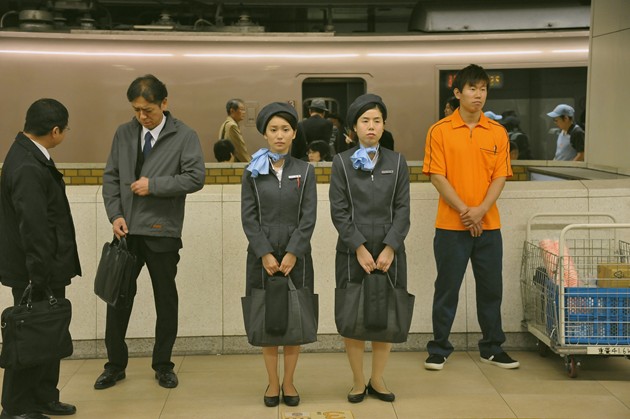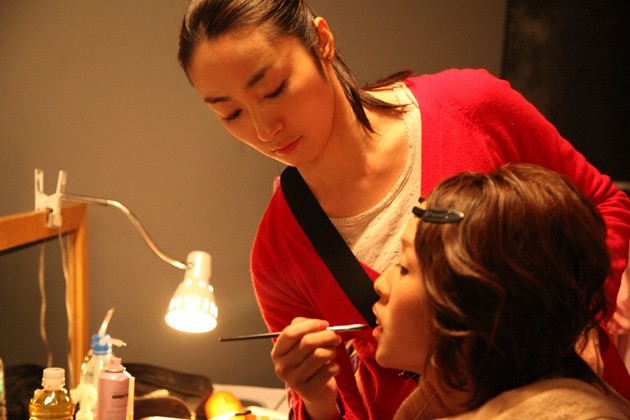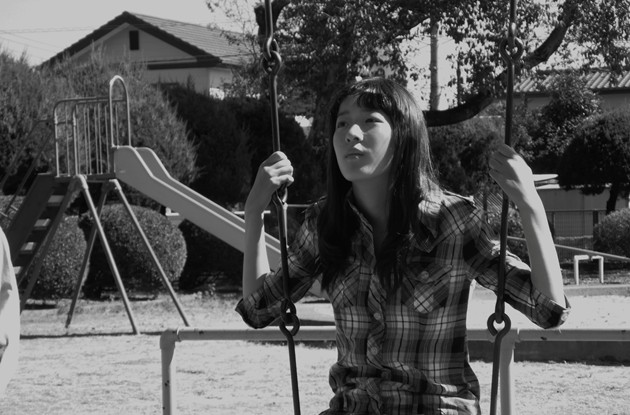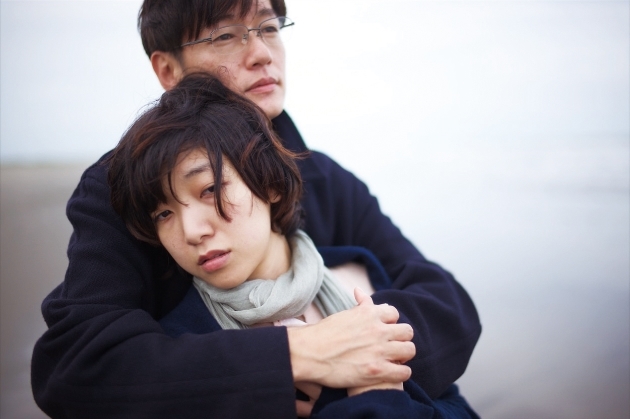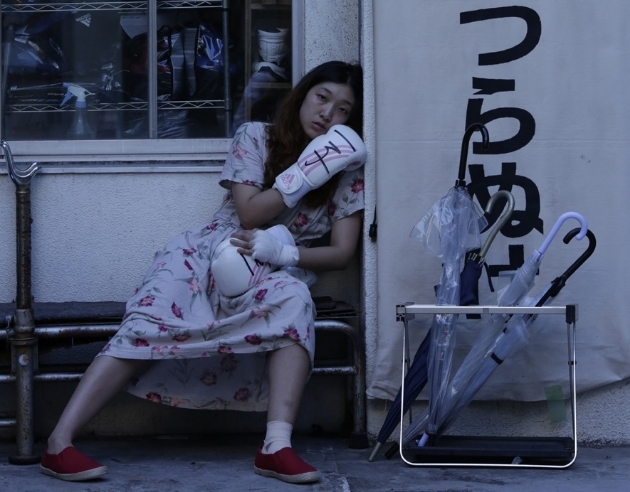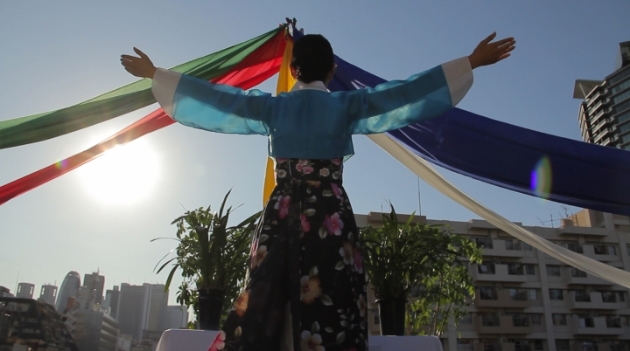Dustin Chang and Christopher Bourne, our intrepid vets of the fest, bring you an in-depth preview gallery of some of the offerings this exciting and unique festival has to offer in 2015.
Dustin Chang and Christopher Bourne
contributed to this story.








HIBI ROCK: PUKE AFRO AND THE POP STAR - Opening Night Film. July 9, 9pm [Introduction and Q&A with director Irie Yu, followed by OPENING NIGHT Party!]
Returning to Japan Cuts this year with two films (Hibi Rock and Joker Game), Irie Yu is a familiar face around this part of the world with his crowd pleasing films depicting Japan's indie music scene- 8000 Miles Series, Ringing in their Ears. His new film Hibi Rock: Puke Afro and The Pop Star, once again, plunges us into that music world he knows intimately.
Based on the popular manga by Enokiya Katsumasa, Hibi Rock concerns the minimally talented rock band Rock 'n' Roll Brothers (Hibinuma- guitar/vocal, Yoda- drums and Kusakabe- bass). The film is, more than any other Irie film, at its most cartoonish, but also most fun: lead singer Hibinuma (Nomura Shuhei), with his afro, deer in the headlight expression and his mouth agape, is ripped straight out of a manga page. Keeping in that cartoonish spirit there's also a lot of ball kicking and instantaneous nose-bleeding at exposed boobies.
Always the underdogs, the Rock 'n' Roll Brothers barely survive on cleaning toilets of the small venue they sometimes get to play at. But their luck changes when a super pop idol Saki Udagawa (Nikaido Fumi of Ringing in Their Ears and Why Don't You Play in Hell?) takes an interest in their music. It's not really their skills she's thrilled with, but their infectious energy and freedom. Because what's the point of rocking out if you are not free? Saki reminisces about her humble beginning in a high school band playing guitar. She tells Hibi that she is empty inside even though she is a mega star. She is well aware that her fame and popularity will fade away. She wants him to write her a song.
After getting rejected by Saki's all powerful promoter, the downtrodden Rock 'n' Roll brothers split up. Hibi ends up working at a fish cannery, Yoda in construction and Kusakabe in lumber. Hibi learns the news that Saki is hospitalized and in serious condition and decides to deliver the song he wrote for her. So he runs to Tokyo, the note he wrote the song on in one hand and a dead fish in the other.
As usual, Irie's penchant for portraying lovable losers and youthful energy takes center stage in Hibi Rock. Nomura's perfect as an all out cartoonish front man and a virgin. Even though she plays a sick girl, Nikaido's smile still kills. Hibi Rock is a loving tribute to the spirit of Rock 'n' Roll. - Dustin Chang
ROUND TRIP HEART - July 10, 6:30pm; director intro/Q&A
Tanada Yuki is an immensely talented director and screenwriter whose films have made frequent appearances in past editions of Japan Cuts: Moon and Cherry (2004), One Million Yen Girl (2008), Ain’t No Tomorrows (2008), The Cowards Who Looked to the Sky (2012). Her latest, Round Trip Heart (original Japanese title: “Romance”), is the least artistically resonant and most conventional of her films, but there still remains some atmospheric qualities and very good performances that make it worth seeing.
Hachiko (Oshima Yuko, formerly of the J-pop juggernaut AKB48) is an attendant on the “Romancecar” express train service that connects Shinjuku Station with popular tourist destinations. She prides herself on the quality of her work and has been commended for it, but unlike the train tracks that define her daily route, her existence outside of work is much more aimless. One day, she catches a passenger, Yoichi (Okura Koji), trying to steal a snack from the food cart without paying. Hachiko doggedly seeks punishment for Yoichi, and when he tries to flee the scene, Hachiko chases him, stranding her in the town of Hakone. While the two wait for a train to take them back, Yoichi – who turns out to be a deeply in-debt movie producer – happens to read a letter from Hachiko’s estranged mother that she’s been carrying with her. Yoichi believes that the letter hints that Hachiko’s mom may be staying in the town, and may possibly be contemplating suicide. He impulsively rents a car and offers to help Hachiko search for her mother. Though she’s outraged by Yoichi’s spying and wary of his ambiguous intentions, Hachiko agrees to go with him around the town.
Eventually the painful areas of Hachiko’s past, and the unresolved issues that have kept her from moving forward in life, are revealed on this road trip. Round Trip Heart seems to exist mostly as a tourist advertisement for Hakone; its natural beauty and local attractions are prominently featured. And though there is much emotional content in Hachiko and Yoichi’s backstories, the film is oddly lacking in real dramatic juice or any sense of tension or conflict. Everything is smooth and easy-going to a fault, and there’s very little emotional payoff in the conclusion. Still, Okura and Oshima prove to be appealing performers, providing Round Trip Heart with its most compelling reasons for watching. -Christopher Bourne
MAKEUP ROOM - July 10, 8:45pm
Veteran adult-video director Morikawa Kei delivers Makeup Room, a funny, witty, and skillfully executed film based on his experiences, which was originally a stage play. There is a seamless transition here from theater to cinema, as the film preserves the idea of never leaving the titular room, part of the set of an AV film shoot. Unusually for a film about porn, there are no sex scenes; all the sex that happens occurs off-screen, and we occasionally hear some of it throughout the film.
Other than the subject matter, the movie that we witness being made is not at all dissimilar to any low budget indie film. A frazzled director, diva actresses, myriad mix-ups and mishaps, having to change and improvise at a moment’s notice – again, any filmmaker, porn or not, can relate to what happens here. In this case, there’s a bit of realism to the proceedings arising from the fact that the actresses who appear in the film are actual adult video stars.
The eye of this film shoot’s chaotic storm is makeup artist Kyoko (non-AV actress Morita Aki), who not only makes the actresses look good but is also a kind of den mother to them, always there with a reassuring word and a sympathetic ear. Her character helps to center the action and represents a pleasing balance to the other anxious folk in the film.
Makeup Room admirably refuses the clichés of exploited and psychologically damaged porn performers. Though they are sometimes called upon to do degrading things like rape scenes, these women are no victims. Though they have problems, they generally like what they do, and don’t dwell in shame. And if the dialog is sometimes a little too on the nose (one actress says she has sex to fill the hole in her soul), and if sometimes cliché creeps in (the shy, almost virginal newbie is revealed as a potential nympho), Makeup Room ultimately succeeds by being refreshingly lighthearted and sex-positive. -Christopher Bourne
AND THE MUD SHIP SAILS AWAY -July 11, 12:30pm
Takashi (Shibukawa Kiyohiko) may be stuck in a rural town in Tochigi Prefecture, but his cynical and casual slacker attitude would make him equally at home in Williamsburg or Greenpoint, Brooklyn. He’s the hero (if you can call it that) of Watanabe Hirobumi’s And the Mud Ship Sails Away, which owes such a debt to Jim Jarmusch (from the deadpan action and dialog delivery to the black-and-white photography) that the filmmakers ought to be paying royalties. Yet there’s such an easy charm on display that one forgives this sense of derivativeness.
Takashi refuses to get a job or contribute to society in any way, preferring to hang out and watch TV with his grandmother, or play at the pachinko parlor. He’s the son of a long-gone deadbeat dad, as well as a deadbeat dad himself, with an angry ex-wife and a five-year-old kid he can barely be bothered to ask about. Into his existence drops Yuka (Takahashi Ayasa), who claims to be his half-sister from an affair his father had with her mother. She sizes him up immediately as a dissolute loser and berates him for his lack of activity, even though she doesn’t seem to be doing much herself. She’s fleeing a disagreeable situation at her home, and though she insults him, she doesn’t refuse his offer to stay.
The characters amble on, and there are some incidents: Takashi and his friend attempt to spy on couples having sex at a local lovers’ lane; Takashi is offered work as a drug mule; Takashi fights the repeated ministrations of a 3/11 disaster charity collector, who may be running a scam. It all moves with a rigorously understated yet often very humorous style, until the final section, which takes an unexpected and rather bold turn into the surreal, exploding the studied Jarmusch-isms up to that point and running the risk of derailing the film entirely. However, it actually succeeds in enhancing the resonance and memorability of the work, and suggests that Watanabe may have more talents up his sleeve that will come to fruition in future films. -Christopher Bourne
HARUKO’S PARANORMAL LABORATORY - July 12, 6:30pm
Lisa Takeba follows up her debut film The Pinkie (which played last year’s Japan Cuts) with her second feature, an extremely energetic mash-up of Japanese pop culture satire, romantic comedy, gross-out humor, and all around outsized quirkiness.
The title character Haruko (Nozaki Moeka), has a long-simmering resentment against her father for being responsible for an embarrassing childhood incident, where she was humiliated in front of her classmates. Also, her brother was abducted by aliens when she was a teenager. Now grown up, she’s a receptionist at a sauna who at home has a penchant for cursing the insipid entertainment on her TV, which oddly is a 50’s black-and-white model. But one day the TV talks back, and transforms into a man (Nakamura Aoi), henceforth known as “Mr. TV.” He’s a rather handsome fellow, notwithstanding having a TV for a head. Soon Haruko and Mr. TV become cohabitating lovers (a situation greatly helped by Mr. TV’s impressive genital endowments). But Mr. TV eventually tires of being a kept man, and goes out to look for work. He becomes a popular TV personality; his gift of being able to speak 12 languages and his looks make him a media sensation. However, Mr. TV begins to have memories of a wife and child, causing him to lose sexual interest in Haruko. Though she’s disappointed, she agrees to help Mr. TV look for his long-lost family.
Takeba’s filmmaking strategy is basically to throw everything she can think of at our eyeballs and see what sticks, which accounts for the uneven nature of this film. She paints a bizarre world where alien abductions and hybrid human/appliance creatures are normal phenomena no one seems to bat an eye at. The frenetic activity and excess of quirk on display all but guarantees that this won’t be to everyone’s taste. But there’s a genial sweetness to it all that ultimately appeals; that and the slim 76-minute runtime makes for a mostly harmless and diverting bit of entertainment. -Christopher Bourne
ASLEEP - Centerpiece Presentation. July 16, 6:30pm [Introduction and Q&A with star Ando Sakura]
Based on one of the 3 stories from Yoshimoto Banana's novel of the same name, Asleep, tells the story of Terako (Ando Sakura of Love Exposure, 0.5mm, Penance), a young woman having an affair with an older, married man, Iwanaga, whose wife is in a coma. Terako spends most of her days in her bed under the fluffy covers in her underwear. She is kind of a kept woman in a sense, because Iwanaga wants her at his beck and call. She prods him about his wife during their rendez-vous in cheap hotel rooms, but he obviously doesn't want to talk about it much. Terako also struggles with the memories of Shiori, her roommate whose suicide impacted her life greatly. Shiori was sort of a 'sleep prostitute' - a person who keeps you company when you sleep.
The act of sleeping in Asleep is akin to clinical depression. It's an exhausting affair. Terako finally realizes that Shiori's role to all those lonely people was to absorb their darkness like a sponge. Hence, she theorizes her roommate's death as sheer exhaustion from taking all that darkness. She needs to get out of her sleep-walking life. And the help comes from an unexpected source.
The film is far from sad and gloomy. Always enigmatic, Ando channels her soft, feminine side and gives our somnambulist heroine the subtlest, perfect emotional range. Photographer cum director Wakagi Shingo's uncluttered simple, airy look also betrays its potentially dark subject. In Wakagi's soft-edged world waking moments are just as comforting and warm as your own bed. - Dustin Chang
100 YEN LOVE - Centerpiece Presentation. July 16, 8:45pm [Introduction and Q&A with star Ando Sakura with CUT ABOVE award ceremony. Followed by the PUNCH LOVE Party!]
I'm madly in love with Ando Sakura. 100 Yen Love tells of a 32-year old no-do-gooder and a virgin slob Ichiko (Ando). She still lives with her parents. She is unwilling to help her mom's small bento shop business, and gets into fist-fights with her just-divorced-single-mom sister. Her only outside contacts are a 24-hour 100 yen shop -American equivalent of a dollar store- where she gets her sustenance (junk food) from, and a nearby boxing gym where she gets glimpses of a boxer, Yuji (Arai Hirofumi) exercising. He's not good looking or anything, but she is entranced somehow.
After a big fight with her sister, Ichiko moves out and with the help of her softie mom, she gets a small flat and gets a night shift at the 100 Yen store. Working there, she meets an assortment of weirdos who are just as much losers as she is. She even hooks up with Yuji, who always seems to forget his bananas he just bought at the store. "Why did I ask you out? Because I knew you wouldn't say no." He said coldly on their first date at the zoo. He invites her to his boxing match where he gets beaten badly. He says that he's 37 and that was his last match.
After being raped by a shady older co-worker, Ichiko decides to take up boxing herself. The coach mistakenly thinks that she's there to lose some weight but slowly and surely sees that she is determined to kick some ass, or maybe her own ass.
Think of this as a Jake LaMotta style transformation, only in reverse- Ichiko trains really hard and becomes a fit, ferocious girl. When asked by Yuji why boxing, she demurely answers, "I like how you hug each other and tap your shoulders after the match".
We know she is 100 Yen kind of a gal. She says so herself. But would she stay a loser forever? The film is a total underdog story that largely relies on Ando and she gives, hands down, the best performance of the year here. Heart breaking and poignant, 100 Yen Love is easily one of the best films I've seen in years. - Dustin Chang
VOICE OF WATER - July 17, 8:45pm
Veteran indie filmmaker Yamamoto Masashi (Three Points) directs this intriguing story involving a beautiful Zainichi (Korean-Japanese) shaman.
What started out as a half-hearted, simple easy money making scheme- palm reading with the help of her best friend Mina (Shuri), Minjung (Hyunri), a granddaughter of shimbang (Korean Shaman) becomes the face of a religious cult, God's Water, which is backed by a suave ad executive Akao (Murakami Jun) who sees money in the venture. Her sincere attitude, exoticism and beauty are the selling points, showing real compassion for troubled, but gullible souls who pour out their sob stories in front of her.
In the meantime, Minjung's no-good father Mikio, who owes a lot of money to a ruthless yakuza, shove himself again in to her life and in to the God's Water organization as a janitor.
Minjung starts to feel the fang of conscience about what she's doing. Mina assures conflicted Minjung that even though she doesn't have special powers, she is indeed helping these lost souls. After Minjung's encounter with an old blind woman, she has a breakdown and announces that she is leaving God's Water. It's a shock to everyone and puts the organization in frenzy to find a replacement. She embarks on a journey to find her family roots and her purpose in life in the woods of Saitama.
Yamamoto's interest doesn't rely on sensational aspects of the religious cult as it is often portrayed in films. It's also not an all out satire on modern illness of gullible lost souls grabbing at the straws for salvation. It's mostly about a Zainichi woman's journey to find her family roots that she never knew before, through traditional elements from her ancestry. The ending is somewhat predictable with the gangster plot and you-can't-cure-damaged-goods storyline. But Voice of Water is deeply humanistic and thoughtful and a completely different take on typical prejudice, racism ridden minority story. - Dustin Chang

Around the Internet
Recent Posts
Leading Voices in Global Cinema
- Peter Martin, Dallas, Texas
- Managing Editor
- Andrew Mack, Toronto, Canada
- Editor, News
- Ard Vijn, Rotterdam, The Netherlands
- Editor, Europe
- Benjamin Umstead, Los Angeles, California
- Editor, U.S.
- J Hurtado, Dallas, Texas
- Editor, U.S.
- James Marsh, Hong Kong, China
- Editor, Asia
- Michele "Izzy" Galgana, New England
- Editor, U.S.
- Ryland Aldrich, Los Angeles, California
- Editor, Festivals
- Shelagh Rowan-Legg
- Editor, Canada



